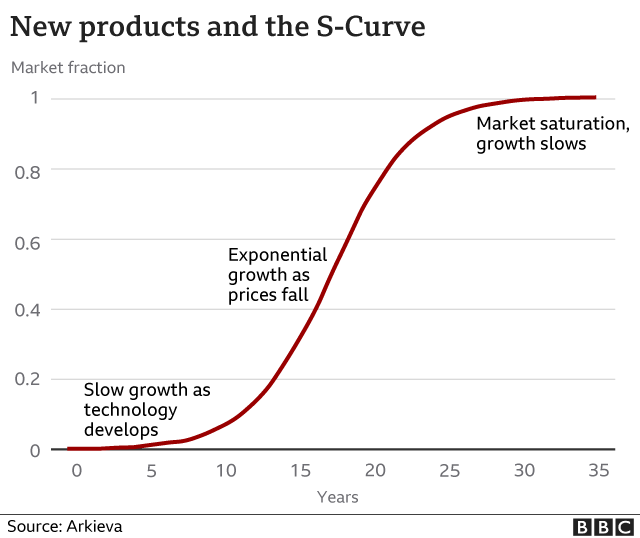Are Electric Cars The Future?
The idea of what the future of transport looks like has changed drastically across the decades.
In the 40s and 50s, everyone assumed we’d have flying cars or personal jet packs. While we’re inching closer to self-driving cars, electric cars are the futuristic mode of transport we’re most likely to be driving in the near future.
You’ve probably read articles or seen reports on the news about why electric cars are better for the environment and the “electric-car revolution” that’s coming. But when exactly can we expect this revolution?
An end to the production and sale of petrol and diesel cars is on the horizon. So, the possibility of all cars in the UK being electric might be closer than you think.
Electric cars and the S curve of technology trends
It may have seemed when people first started talking about electric cars that the “electric-car revolution” would be just around the corner.
However, technology trends can often take a little time to settle in before they explode in popularity.
Take the internet. In the 90s and early 2000s, everyone was talking about how it would change the world. And it did. It just didn’t happen overnight.
Successful technologies don’t follow a straight line of success. It’s more like an elongated S curve.
They start slowly at the bottom of the S and curve gradually before exploding up.
Right now, the popularity of electric cars is probably at the bottom of the S, at the start of that shallow curve upwards. If the trend continues, we’ll start to see interest grow as prices fall.
Here’s a handy illustration from the BBC article, Why electric cars will take over sooner than you think.

But the growth of this curve and the popularity of electric cars rest on a few things happening.
How fast will electric cars replace petrol and diesel cars?
The answer is very fast. However, the question you should really be asking is, when will electric cars replace petrol and diesel cars?
To answer this, we need to consider what will encourage people to buy electric cars.
A few key factors will help to increase the popularity of electric cars, including:
- the price of electric cars going down
- the range and performance of electric cars improving
- the ability to charge electric cars becoming easier
- a ban on petrol and diesel cars
- incentives to replace petrol and diesel cars with electric cars
Many of these things are already happening.
The price of electric cars is coming down, with people making further savings on running costs in comparison to petrol and diesel cars. And the capacity of batteries is also increasing.
In 2020, the first battery capable of powering a car for a million miles was launched.
Another important factor is a country’s approach to incentivising the purchase of electric cars and banning the production and sales of petrol and diesel cars.
So, let’s look at what the UK is doing to encourage people to ditch their petrol and diesel cars in favour of electric.
When will petrol and diesel cars be banned in the UK?
Originally, a ban on sales of new petrol and diesel cars was set by the UK government for 2040.
This was brought forward to 2035, the date the sale of new hybrid cars will be banned.
However, as part of a new government plan to tackle climate change, this date was brought forward again. Now, in 2030 the UK will see an end to the sale of new petrol and diesel cars.
To encourage more people to buy an electric car, the government is offering a plug-in car grant which takes £2,500 off the price of a new electric car.
Plus, there’s a £350 grant towards the cost of a home charger.
In London, a £25m scrappage scheme was announced to take older cars and motorbikes off the streets. Nothing has been announced for the rest of the UK yet, but it could be a consideration.
The UK government is also investing £500 million in battery development and the mass production of electric cars.
What year do all cars have to be electric?
The UK government hasn’t set a date for when all cars should be electric.
However, the 2030 ban on new petrol and diesel cars does mean that their numbers on the road will be greatly reduced. With about a third of CO2 emissions in the UK coming from transport, this will help move the country towards the government’s net-zero target.
According to a forecast by the investment bank UBS, by 2025 20% of all new cars sold globally will be electric. This figure is expected to increase to 40% by 2030 and, according to UBS, by 2040 virtually every new car sold globally will be electric.
The future of electric cars is looking bright
Let’s return to our original question… are electric cars the future?
The ban on new petrol and diesel cars in 2030, combined with incentives to purchase electric cars and investments in the industry, suggests that yes, they are. Not to mention the clear environmental benefits that they can bring.
And things certainly seem to be moving in the right direction.
In 2020, global sales of electric cars rose by 43%, despite overall car sales falling by a fifth during the coronavirus pandemic.
As the S curve of the electric-car trend rises, you can make your own mark on the future of eco-friendly transport by buying your first electric car.
If you want to find out more about the range of electric vehicles on offer at Nathaniel Cars, pop into our Cardiff or Bridgend showroom. Our plug-in car experts will be happy to answer your questions.
Ask Our EV Experts
Please fill in the form below to send us your message and we will contact you back shortly


















